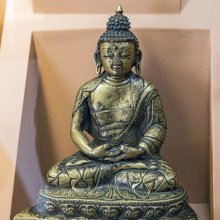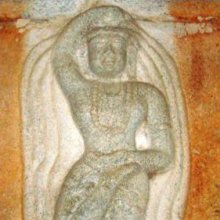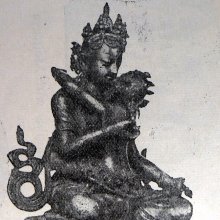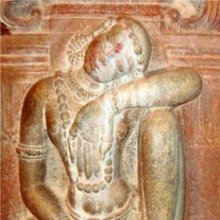Dhyanin, Dhyāni, Dhyānī, Dhyani, Dhyānin: 13 definitions
Introduction:
Dhyanin means something in Buddhism, Pali, Jainism, Prakrit, Hinduism, Sanskrit, Marathi, Hindi. If you want to know the exact meaning, history, etymology or English translation of this term then check out the descriptions on this page. Add your comment or reference to a book if you want to contribute to this summary article.
Images (photo gallery)
(+204 more images available)
In Buddhism
Tibetan Buddhism (Vajrayana or tantric Buddhism)
Source: archive.org: The Indian Buddhist IconographyDhyāni (ध्यानि) refers to the “five Dhyāni Buddhas”, representing the five Skandhas (cosmic elements) of which the world is composed, according to Vajrayāna or Tibetan Buddhism.—It is in the Guhyasamāja that the idea of a pantheon, rationally classified, is properly and systematically crystallised. Here for the first time are found the descriptions of the five Dhyāni Buddhas, their mantras, their Maṇḍalas and their Śaktis or female counterparts. These Dhyāni Buddhas represent the five Skandhas or the five cosmic elements of which the world is composed. They are here described as the progenitors of the five Kulas or families of gods and goddesses.
The five Dhyāni Buddhas are the corner stones of Buddhist Iconography on which the whole edifice of the Buddhist pantheon is erected. The five Dhyāni Buddhas are the progenitors of the five Kulas or families of deities, and the community worshipping them were known as the Kaulas, and the process of worship was called Kulācāra or family conduct. These Dhyāni Buddhas further split themselves up in the form of Bodhisattva and their female principles who are responsible for creating everything found in existence. The forms of deities are nothing but the gross forms of the different sounds, and thus the connection of the mantra with the deity is established.
The five/six Dhyāni Buddhas (and Spiritual consort—Offspring):
- Amitābha (Pāṇḍarā—Padmapāṇi),
- Akṣobhya (Māmakī—Vajrapāṇi),
- Vairocana (Locanā—Samantabhadra),
- Amoghasiddhi (Tārā—Viśvapāṇi),
- Ratnasambhava (Vajradhātviśvarī—Ratnapāṇi),
- Vajrasattva (Vajrasattvātmikā—Ghaṇṭāpāṇi)
The Dhyāni Buddhas are a peculiar kind of Buddhas who are not required to pass through the stage of a Bodhisatta. They were never anything less than a Buddha. They are always engaged in peaceful meditation, and they voluntarily abstain themselves from the act of creation. To create is the work of their emanations, the Divine Bodhisattvas.

Tibetan Buddhism includes schools such as Nyingma, Kadampa, Kagyu and Gelug. Their primary canon of literature is divided in two broad categories: The Kangyur, which consists of Buddha’s words, and the Tengyur, which includes commentaries from various sources. Esotericism and tantra techniques (vajrayāna) are collected indepently.
In Jainism
General definition (in Jainism)
Source: The University of Sydney: A study of the Twelve ReflectionsDhyānin (ध्यानिन्) refers to a “meditator”, according to the 11th century Jñānārṇava, a treatise on Jain Yoga in roughly 2200 Sanskrit verses composed by Śubhacandra.—Accordingly, “Thus, when the meditator continually thinks about (dhyānin—aniśaṃ dhyānī tat) what is free of mundane existence (i.e. the Jina) by means of uninterrupted meditation, that is called [meditation] with support [of the Jina]”.

Jainism is an Indian religion of Dharma whose doctrine revolves around harmlessness (ahimsa) towards every living being. The two major branches (Digambara and Svetambara) of Jainism stimulate self-control (or, shramana, ‘self-reliance’) and spiritual development through a path of peace for the soul to progess to the ultimate goal.
Languages of India and abroad
Marathi-English dictionary
Source: DDSA: The Molesworth Marathi and English DictionaryDhyānī (ध्यानी).—a (S) Meditative, reflective, contemplative; esp. that engages in profound and abstract contemplation.
Marathi is an Indo-European language having over 70 million native speakers people in (predominantly) Maharashtra India. Marathi, like many other Indo-Aryan languages, evolved from early forms of Prakrit, which itself is a subset of Sanskrit, one of the most ancient languages of the world.
Sanskrit dictionary
Source: DDSA: The practical Sanskrit-English dictionaryDhyānin (ध्यानिन्).—a. contemplative, engaged in religious meditation.
-buddhaḥ, -bodhisattvaḥ a spiritual Buddha.
Source: Cologne Digital Sanskrit Dictionaries: Edgerton Buddhist Hybrid Sanskrit DictionaryDhyāni (ध्यानि).—(°-) [ (buddha, -bodhisattva), produced by medi- tation (trance): Burnouf, Introd. 117 and Lotus 400; Müller on Dharmasaṃgraha 3, where five such Buddhas are listed. I have failed to note any actual occurrence in my texts. P. Mus calls them ‘transcendent’ Buddhas in his searching study cited s.v. Buddha, end.]
Source: Cologne Digital Sanskrit Dictionaries: Benfey Sanskrit-English DictionaryDhyānin (ध्यानिन्).—i. e. dhyāna + in, adj., f. nī = dhyānavant, Mahābhārata 13, 1016.
Source: Cologne Digital Sanskrit Dictionaries: Monier-Williams Sanskrit-English DictionaryDhyāni (ध्यानि):—[from dhyai] in [compound] for nin.
Source: Cologne Digital Sanskrit Dictionaries: Monier-Williams Sanskrit-English DictionaryDhyānin (ध्यानिन्):—[from dhyai] mfn. contemplative, engaged in religious meditation, [Mahābhārata]
Source: DDSA: Paia-sadda-mahannavo; a comprehensive Prakrit Hindi dictionary (S)Dhyānin (ध्यानिन्) in the Sanskrit language is related to the Prakrit word: Jhāṇi.
[Sanskrit to German]
Sanskrit, also spelled संस्कृतम् (saṃskṛtam), is an ancient language of India commonly seen as the grandmother of the Indo-European language family (even English!). Closely allied with Prakrit and Pali, Sanskrit is more exhaustive in both grammar and terms and has the most extensive collection of literature in the world, greatly surpassing its sister-languages Greek and Latin.
Hindi dictionary
Source: DDSA: A practical Hindi-English dictionaryDhyānī (ध्यानी) [Also spelled dhayani]:—(a) meditative; given to meditation/contemplation; —[jñānī] given to meditation and contemplation.
...
Kannada-English dictionary
Source: Alar: Kannada-English corpusDhyāni (ಧ್ಯಾನಿ):—[noun] a person engaged or habitually engages, in deep and abstract, religious meditation.
Kannada is a Dravidian language (as opposed to the Indo-European language family) mainly spoken in the southwestern region of India.
See also (Relevant definitions)
Ends with: Mrishadhyanin.
Full-text (+130): Manibhava, Dhyanibuddha, Dhyana, Vishvapani, Vairocana, Five Dhyani Buddhas, Jhani, Dhyaniya, Dhyanibodhisattva, Dhayani, Jnanin, Mrishadhyanin, Manushibuddha, Vajrasattvatmika, Dhyayin, Locana, Anisha, Tathagatamandala, Cundra, Canda.
Relevant text
Search found 20 books and stories containing Dhyanin, Dhyāni, Dhyānī, Dhyani, Dhyānin; (plurals include: Dhyanins, Dhyānis, Dhyānīs, Dhyanis, Dhyānins). You can also click to the full overview containing English textual excerpts. Below are direct links for the most relevant articles:
The gods of northern Buddhism (by Alice Getty)
Stupas in Orissa (Study) (by Meenakshi Chauley)
Buddha Images < [Chapter 5]
Vajrayana form of Buddhism < [Chapter 2]
Emanations of Vairocana < [Chapter 5]
The Indian Buddhist Iconography (by Benoytosh Bhattachacharyya)
Figure 17 - Buddha in different Mudrās (Nalanda)
Figure 18 - Buddha in different Mudrās (Java)
Prajnaparamita in Buddhist < [November-December 1931]
Borobudur < [July 1938]
Creation and Artist < [April 1971]
Sripura (Archaeological Survey) (by Bikash Chandra Pradhan)
Scultures of Buddhist Goddesses (1): Tara < [Chapter 3 - Sculptural Programme]
Scultures of Maitreya < [Chapter 3 - Sculptural Programme]
Scultures of Buddhist Goddesses (4): Vasudhara < [Chapter 3 - Sculptural Programme]
Jainism in Odisha (Orissa) (by Ashis Ranjan Sahoo)
Padmaprabha image, Padmavati Thakurani, Narendrapur < [Chapter 3: Survey of Jaina Antiquities in Odisha]
Khiching Museum, Khiching < [Chapter 3: Survey of Jaina Antiquities in Odisha]



.jpg)

